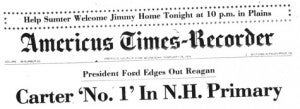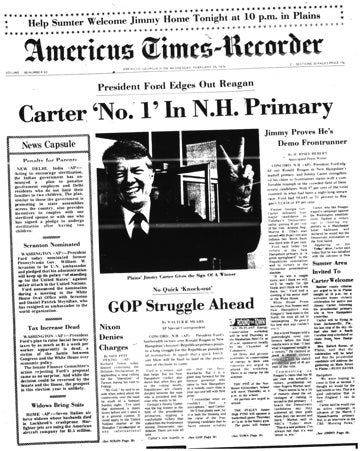Winning up north in ’76: Ga.’s Carter took N.H.
Published 2:00 pm Friday, February 26, 2016
By D. JASON BERGGREN
www.americustimesrecordercom
On the night of Feb. 24, 1976, 40 years ago, before a delighted crowd of supporters in Manchester chanting “We’re number 1, we’re number 1,” Jimmy Carter claimed victory in the New Hampshire Primary. Referring to the fact that he had been a political unknown, he said, “I remember when we couldn’t find a microphone.”
Carter had his second major victory of 1976. Before his audience, he displayed the V sign for victory. He won Iowa the previous month, and now he won New Hampshire. The former governor of Georgia proved he was not a regional candidate and that “being from the South was not the handicap” some election observers had anticipated. The election results, he said, showed that “a progressive Southerner can win in the North.” With wins in the Midwest and the Northeast, Carter was demonstrating national appeal. On NBC’s Today show, Carter said, the victory in New Hampshire was “a good indication that in New England I can do well.” This claim would be tested in the March 2 Massachusetts primary.
Carter and Arizona congressman Morris Udall were considered the favorites to win the primary, but it was too close to call. With 28 percent of the vote, the Associated Press called Carter “the big winner.” It was said that he won with a “comfortable” margin and was emerging as “the frontrunner among Democratic candidates.”
Carter’s success began earlier in the day when he won Dixville Notch, a voting precinct located at a mountain resort in northern New Hampshire, where the first votes in the state were cast. The vote took place at midnight on the day of the primary at the Balsams hotel. Carter received six out of the nine Democratic votes. Three of his opponents received one vote apiece.
Following Carter’s statewide vote total was Morris Udall with 23 percent, Birch Bayh with 15 percent, Fred Harris 11 percent, and Sargent Shriver 8 percent. Each of the remaining candidates polled below 5 percent. The New York Times reported that Carter won the conservative Democratic vote “by far” and split the moderate vote with Udall. However, he performed “poorly among liberals.”
Liberal Democrats divided their votes. Had they consolidated behind one candidate, such as Udall, Carter could have been defeated. Later, in the campaign season, some did attempt this in what became known as the “A.B.C.” movement — “Anyone But Carter.” The “Stop-Carter” Democrats accused the Georgian of being too conservative, “acting like a Republican,” and “peddling Republican principles.”
Carter’s New Hampshire campaign, headquartered in Concord with nine field offices, was effectively directed by Chris Brown and Bill Shaheen. Crucial help also came from Georgia. Known as the “Peanut Brigade,” supporters from Sumter County and from other parts of Georgia traveled to New Hampshire to campaign for one of their own. Among them were members of the Carter family, including the candidate’s wife, his aunt, his sons and their wives. To win commitments of support, a personal appeal was often used. For instance, Carter’s son Chip was quoted as saying to voters, “Hello, I’m Chip Carter. My dad is running for president. I would appreciate your voting for him.”
Despite the frigid cold and the snow, the Georgians knocked on doors, made contacts, distributed campaign literature, and gave out small bags of peanuts with Carter’s name and image on them to potential backers. Newsweek identified the southern visitors as “carpetbaggers from Georgia.”
Two trips were made to the state; one in early January and the other in February days before the vote. According to the Americus Times-Recorder’s Jan. 13 edition, 92 Carter volunteers, ranging in age 18 to 75 years, were part of the first New Hampshire “blitz.” As reported in the article, “Carter ‘Blitzers’ Back from Frozen North,” the temperature during their campaign “dipped to a bone chilling 19 below zero degrees.” Undaunted by the winter elements, the Peanut Brigadiers were there “to tell the world and America about Jimmy Carter.” They were determined, Betty Pope explained, “to try and see Carter come out on the top in the New Hampshire primary.”
In its Feb. 18 edition, the Americus Times-Recorder ran the piece, “Carter Supporters to Leave for N.H.” With a week to go, the article noted that “approximately 80 supporters of the peanut farmer from Plains will leave today at 7 p.m. from Hartsfield International Airport for six days of door-to-door campaigning.” Subsequent reporting said the number of supporters was 93. When they arrived in Manchester, Carter greeted them at the airport. On this trip, voters in Manchester, Nashua, Concord, and Portsmouth, all important cities in the southern part of the state, were especially targeted. Berlin and Gorham were targeted upstate.
In his book, Jimmy Carter’s Peanut Brigade, Harold Isaacs, a professor of history at Georgia Southwestern, noted that Carter canvassers from Georgia went up to New Hampshire to tell voters that they were backing the former Georgia governor because of his character, because of his scandal-free four years as governor, and because they believed in him. Others went there to say, “I am up here on behalf of my friend, Jimmy Carter.”
Carter’s opponents were frustrated by his success, Isaacs wrote. One canvasser who happened to stay at the same hotel as Udall happened to run into the Arizona congressman. Upon seeing her many Carter buttons, Isaacs explained, Congressman Udall “groaned, ‘God, he’s everywhere’.” To which the canvasser responded, “Yes, God is everywhere and so is Jimmy Carter.”
After the primary victory, Carter headed home the next day to Plains where, according to the Americus Times-Recorder, he was greeted by “several hundred enthusiastic local area citizens, from the very young to the very old, [who] stood in the middle of Plains’ Main Street.” Carter made his way through the crowd, greeting and thanking them for the support. It was a “great welcome home.” The Americus High School band played, “Happy Days are Here Again.”
In his remarks, Carter asserted that he would win the Democratic nomination “on the first ballot” at the national convention in New York City. “There will be no deadlocked convention, there hasn’t been one since 1924 the year I was born and there won’t be this year.” He was glad to be home. He said, “I look forward to spending tonight in my own home and in my own bed.”
In the March 2, 1976, edition of the Americus Times-Recorder, the editors reflected upon Carter’s triumph in the Granite State. The following are excerpts from their editorial entitled, “New Hampshire.”
“Results of the nation’s first presidential primary constitute solid victories for President [Gerald] Ford and Jimmy Carter …
“Carter’s victory was of major significance in that a moderate could handily defeat all the liberals working against him. In the final days of New Hampshire Carter became the target of many who knew he was the leader. Therefore, unless the former Georgia Governor is badly defeated in Florida, he seems to have a real chance of gathering considerable political momentum …
“Should [George] Wallace lose to Carter, it would be psychologically and politically damaging to Governor Wallace. Should Carter triumph in Florida, he might be on his way — and the more liberal candidates would probably then combine to try to stop the most exciting new face in the party.”
The Florida primary was March 9. It was the first-in-the-South primary and billed as the battle for the South, Old South versus New South. Would the victor be Governor Wallace or would it be Governor Carter? Wallace won the 1972 Florida primary convincingly and was favored to win again. However, Carter had the momentum. He not only wanted a strong showing; he wanted an upset win over his Alabama rival. With wins in Iowa and New Hampshire, Carter said that it was “now quite possible that I can beat Wallace in Florida.”
D. Jason Berggren is an associate professor of political science at Georgia Southwestern State University.







